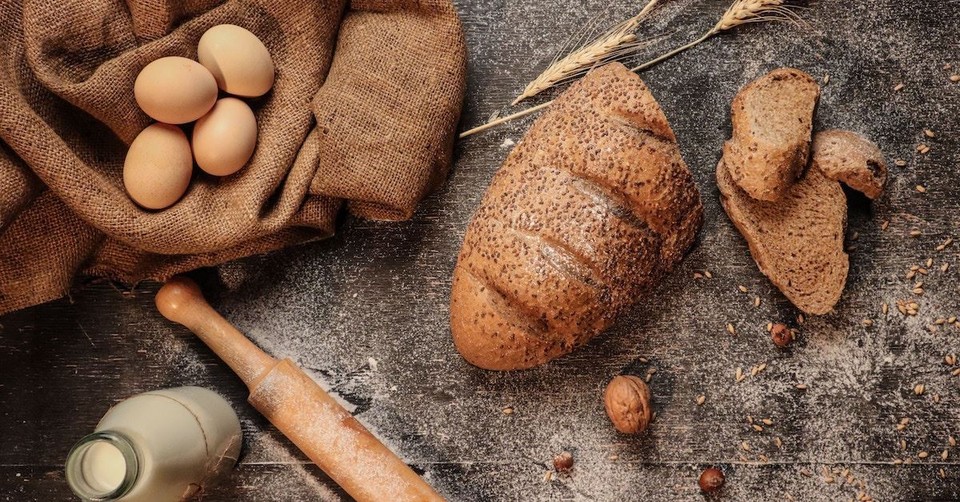What Is the Significance of Bread in the Bible?

The aroma of warm bread beckons us to sit, eat, and savor the taste. Bread is more than a universal food. The Israelites kept twelve loaves on the altar at all times. In the Old Testament bread was the basic food that supported life. Bread also represented the relationship between God and the Israelites and then Jesus and His followers. People shared bread at meals. Paul even used the analogy of bread to describe the unity of believers as ‘being many we are one bread.’ Communion celebrates the sacrifice of Jesus, His presence, and much more. He called Himself the Bread of Life and examining bread in the Bible gives a deeper significance to that statement and communion.
The Threefold Purpose of Bread in the Bible
When God sent Adam and Eve out of the Garden of Eden, he said that Adam would work and sweat for bread. That pointed to the necessity of growing grain for food to survive. We need bread for sustenance. Our hunger also reminds us we depend on God who created food.
Secondly, bread draws us together in fellowship. Abraham used bread for hospitality when he shared bread with his three visitors [Genesis 18] and enjoyed bread serve to him by Melchizedek Genesis 14:17-24]. Jewish tradition includes breaking bread at the beginning of a meal with the words “Blessed art Thou, O Lord our God, King of the universe, who bringest forth bread from the earth.”Jesus gave thanks and broke bread several times in the New Testament and the disciples carried on the breaking of bread in communion.
The third and most significant meaning of bread in the Bible is covenant relationship with God. The grain offerings and the bread on the altar in the Old Testament were part of the covenant symbols between God and the Israelites. Jesus, when he broke bread and shared wine at the Last Supper, said, “This is the new covenant...” (Luke 22:20). In the Bible, faith, bread, and relationship are all connected.
Here are 8 Examples of the Significance of Bread in the Bible
Bread and Hospitality
Relationships develop when we care for one another. Hospitality focusing on serving and caring for another person. In restaurants we are served bread first as a sign of welcoming and generosity or bounty. Abraham not only offered bread, but he instructed his wife to use the finest flour to make the bread [Genesis 18:6]. He offered his guests the best food.
David chose to honor the memory of his dear friend Jonathon with continual hospitality to his son Mephibosheth. In 1 Samuel 9:7 David said he would show him kindness and Mephibosheth would eat bead at his table continually. David showed extravagance. These examples remind us to give our bests to others and be hospitable to strangers and relatives of friends. Part of the hospitality is spending time with the individuals. Do not forget to show hospitality to strangers, for by this some have entertained angels without knowing it. [Hebrews 13:2]. Relaxing at meals with bread inspires conversation and sharing what’s important, including our faith.
Manna and the Bread of Presence
When God guided the Israelites through the wilderness, he gave them bread daily in the form of manna. That showed them He was continually with them and providing for their needs. When the raining down manna from heaven ended God instructed Moses to preserve an omer of manna in a jar [Exodus 16:33]. God also had commanded the priests to always keep twelve loaves of bread on the golden table. Each unleavened loaf weighed close to five pounds. This display served to remind people of God’s presence. The priest made new loaves weekly and the aroma must have filled the air as another reminder that God remained with them. The scent of the bread mixed with the fragrance of incense and other sacrificial offerings the priests made.
Grain Offerings and Sacrifices
God commanded that the priests make sacrifices and offerings for the people. These included grain offerings as described in Leviticus chapters two and six. Oil and incense accompanied the grain the priest lifted up. They also prepared cakes of grain and oil and offer them up in chunks on the altar. The people could smell the scent. The grain offering came after the animal sacrifice.
Jesus served as the sacrificial lamb and the night before his death. He provided the bread offering. We celebrate the bread as well as recall the blood sacrifice of Jesus with communion when we share in the bread and wine. His death, the perfect sacrifice, replaced animal sacrifice. The Apostle Paul stated that every time we share communion, we proclaim the death of Jesus [1 Corinthians 11:26]. That’s a gift Jesus gave for us. He died to free us from sin and death and to give us eternal life. We celebrate that and acknowledge Jesus is the Bread of Life. Bread is a wonderful analogy for Christ.
Loaves and Fishes
The account of Jesus feeding thousands of people with bread and fish shows extravagant love. The miracle went beyond mere food. It showed us the compassion of Jesus and his ability to provide much more than we need seen in the baskets of leftovers. [John 6]
The miracle gave way to a special talk where Jesus stated, “I am the Bread of Life.” He told people they needed to eat his body. He referenced manna in the wilderness that God the Father sent from heaven and declared that he is the bread that came down from heaven. When he continued to say his flesh is true food many people deserted him. He turned to his disciples and dd not say he only meant it symbolically. Instead, for the one and only time, Jesus asked if they wanted to leave. Peter responded that Jesus had the words of eternal life and was the Christ, the anointed one. Jesus invites us to partake of communion and be raised up to new life. [John 6:53-58].
Breaking of Bread
On a dusty dirt road to Emmaus, after the resurrection, two people met Jesus. They did not recognize Him but listened eagerly as Jesus explained scriptures, beginning with Moses in the Old Testament. [Luke 24:13-32]. When He broke bread with them at the end of the journey, their eyes were opened, and they recognized Jesus. The two returned to Jerusalem and shared their experience, sharing how they recognized Jesus in breaking bread. There’s power in communion and the presence of Jesus. When you have communion ask God to open your eyes and your heart.
Bread of Life: Spiritual Food and Daily Bread
Jesus shared a great prayer called The Lord’s Prayer and The Our Father. This includes the words, ‘give us this day our daily bread,’ This implies a dual request for both our essential needs and for Jesus, the Bread of Life. We need Jesus and scriptures to be with us daily. In Matthew chapter four Satan tempted Jesus. Not only did Jesus respond to the devil’s attempt to persuade Jesus to turn stones into bread, Jesus quoted Deuteronomy 8:3 that stated that man does not live on bread alone, but on every word that comes from God. Jesus proceeded to use scripture for every attempt the devil made, even when the devil quoted from a psalm. Jesus showed us that scriptures fuel us and give us the strength to resist temptation. Reading scriptures daily feeds us spiritually and deepens our relationship with God.
Bread in Covenant Relationships
A covenant is an agreement. That bonds God and people together. In the Old Testament Abraham and Melchizedek ratified an agreement between them with bread and wine, the elements of communion [Genesis 14:18-19]. Jesus is in the order of Melchizedek, according to Psalm 110. Melchizedek means king of righteousness and Salem (his city) means peace. Salem became Jerusalem. Priest of the Most High God is the Hebrew word El Elyon. The names reflect the sacredness of the covenant as Abraham and Melchizedek made a peace treaty. That began a tradition of celebrating covenants made with a meal that included bread and wine. The Passover meal is still celebrated with bread and wine, a meal that foreshadowed the communion meal. Jesus shared in Matthew 26:28 that with the new covenant comes forgiveness. Paul explained in Hebrews 9:15 that this gave us a new relationship with God.
Bread in Communion
At the Last Supper that commemorated Passover, Jesus gave thanks, broke bread, shared it and said, “This is my body.” After he gave them wine he declared, “This cup which is poured out for you is the new covenant.” [Matthew 26:19-20]
The bread represented Christ’s body that was nailed to the cross and broken the next day. The wine represented the blood shed on the next day as soldiers pierced his side. Paul warned people to observe it in a worthy manner [1 Corinthians 11:27-29] to void being judged. Communion unites us with Christ, as the Apostle Paul stated in 1 Corinthian 10:17, the sharing in the cup of blessing and bread is sharing in the blood and body of Christ. Christ wants us to be in unity with believers and with Him, including through the fellowship or sharing communion.
Some churches call communion by the Greek word "Eucharist" which means thanksgiving. Truly, we should be thankful as we receive bread and the fruit of the vine. Jesus calls us to share generously, as he shared bread with thousands. The disciples gave us an example, too, as they shared communion and coming together in unity in Acts 2:42.
Luke 6:38 uses terms related to grain. It states, Give, and it will be given to you. They will pour into your lap a good measure—pressed down, shaken together, and running over. For by your standard of measure it will be measured to you in return.” In the marketplace the merchant would measure grain and then press it down or stomp on it to get rid of the air. They then shook it to make room for more. The term lap of luxury comes from this scripture. So, share bread, celebrate God with bread, and be thankful for Jesus, the true bread from heaven.
How the Ingredients of Bread Can Remind Us of Jesus
Bread is made from several basic ingredients. Each one reminds us of a characteristic of Jesus.
- Wheat or other grain: Jesus used a golden kernel of wheat being buried in the ground to produce a great crop to explain His need to die and be buried to bring great glory [John 12:23-24].
- Oil used in anointing prophets and kings reflects Christ, the Anointed One. Oil tenderizes the bread and Jesus and His forgiveness makes our hearts tender.
- Unleavened reflects sinlessness of Christ. The leavening used in the bread of Pentecost [Leviticus 23:15-17] reminds us of the growing kingdom of God. Jesus used leaven to illustrate how the kingdom of God spreads and grows [Matthew 13:33]. The transforming ability of Jesus who causes us to rise to heaven.
- Eggs bring the golden color to bread and add fullness to the taste. Eggs are used to depict the tomb. Jesus spoke of eggs as a good gift [Luke 11:12-13]. He brings fullness to our lives.
- Water (liquids) cause steam within a loaf of bread that causes additional rising. Jesus provides water that springs up to eternal life [John 4:14].
We need all Jesus provides to satisfy our souls.
Karen Whiting (https://www.karenwhiting.com/) grew up making bread and helping in her grandparent’s restaurant business. Her devotional cookbooks The Gift of Bread: Recipes from the Heart and the Table shares insights into bread in the Bible as well as favorite family recipes.
Originally published October 04, 2019.





